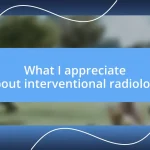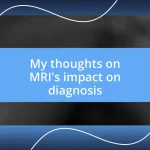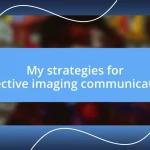Key takeaways:
- Cancer gene therapy offers targeted, personalized treatment options, potentially improving outcomes while minimizing harm to healthy cells.
- Challenges in gene therapy include effective gene delivery, immune responses, high costs, and ethical concerns, but ongoing research holds promise for overcoming these obstacles.
- Future directions in cancer treatment may involve AI for predicting patient responses and integrating lifestyle changes with genetic therapies for a more holistic approach to care.

Understanding cancer gene therapy
Cancer gene therapy represents a transformative approach in the fight against cancer, focusing on altering the genes inside a patient’s cells to treat or prevent the disease. I can’t help but feel a sense of hope when I think about how this therapy could specifically target cancer cells while leaving healthy cells unharmed. Isn’t it fascinating to consider how precise this technology can be compared to traditional treatments?
As I delve deeper, I think about the various methods involved in gene therapy, such as inserting healthy genes to replace mutated ones or using techniques that can directly kill cancer cells. This gets me reflecting on the emotional rollercoaster of watching a loved one struggle through conventional treatments and realizing there might be a gentler, more effective solution out there. It makes me wonder: how many more lives could be saved if gene therapy becomes the norm rather than the exception?
Furthermore, the potential of cancer gene therapy to personalize treatment makes it even more compelling in my eyes. Imagine a world where therapies are tailored just for you or a family member—this idea touched my heart during a conversation with a friend who is a researcher in this field. I could see the excitement in their eyes as they described how gene therapy could adapt to the unique genetic makeup of a patient’s cancer. It’s like crafting a suit that fits just right, instead of a one-size-fits-all approach!

Benefits of cancer gene therapy
One of the most significant benefits of cancer gene therapy is its potential for targeted treatment. It’s like having a specialized tool that goes straight to the problem without causing collateral damage to surrounding healthy cells. I recall a discussion with my colleague, who spoke passionately about a patient who had almost given up hope. After undergoing gene therapy, their cancer was significantly reduced, demonstrating the power of this focused approach. It was inspiring to see how a unique strategy could turn someone’s life around and reignite their fight against cancer.
Moreover, the ability of gene therapy to provide personalized treatment options cannot be overstated. Each patient’s cancer is as unique as their DNA, and I often think about the advances in science that allow therapies tailored to individual genetic profiles. Just the other day, I met someone who shared their journey of receiving one of these personalized therapies. They described it as a revelation—akin to finally receiving a perfect prescription for a long-standing ailment. It was a touching moment, revealing how personalization can foster hope in the bleakest situations.
Another key advantage is the potential for long-term solutions. Instead of just managing symptoms or temporarily eliminating tumors, gene therapy aims to address the root causes of cancer at a genetic level. This prospect excites me because it embodies a forward-thinking mentality in medicine. I once attended a conference where researchers showcased their findings on sustained remission made possible through gene manipulation. The energy in the room was palpable, and it made me optimistic about what the future holds for cancer treatment.
| Benefit | Description |
|---|---|
| Targeted Treatment | Focuses on cancer cells while preserving healthy ones. |
| Personalized Options | Treatments are tailored to the unique genetic profile of the patient. |
| Long-term Solutions | Aim for better outcomes by addressing the root genetic causes of cancer. |

Challenges in cancer gene therapy
Navigating the complexities of cancer gene therapy brings a series of challenges that can be daunting. From my perspective, one of the most pressing issues is how to effectively deliver the therapeutic genes into the target cells. It reminds me of an experience I had trying to hit a bullseye during an archery lesson—no matter how much I focused, hitting the target was tricky. Scientists are facing similar hurdles with delivery systems, as they need to find methods that ensure the genes reach the right cells without being lost or damaged along the way.
Here are some other significant challenges in cancer gene therapy:
- Immune Response: The body’s immune system may recognize the therapeutic agents as foreign, potentially leading to adverse reactions.
- Targeting Off-Target Effects: Unintended modifications to non-cancerous genes can result in serious side effects.
- Regulatory Hurdles: Navigating the approval process requires extensive data, prolonging access for patients.
- Cost and Accessibility: The high expense of gene therapy can create disparities in who can benefit from this innovative treatment.
- Ethical Concerns: The technology pushes boundaries, raising questions about genetic modifications and their long-term implications.
Even with these hurdles, I hold on to a sense of optimism. Just as I learned in that archery lesson—practice, persistence, and innovation often lead to success. With continued research and collaboration, I have no doubt we can overcome these challenges.

Recent advancements in gene therapy
When I look at the recent advancements in gene therapy, I can’t help but feel a sense of wonder. A notable breakthrough is the use of CRISPR technology, which allows scientists to edit genes with remarkable precision. I remember attending a lecture where a researcher passionately spoke about how CRISPR could potentially correct the genetic mutations that cause certain cancers. It struck me how transformative this tool could be, almost like a surgeon’s scalpel for the genome.
Another exciting development is the progress made in viral vectors, which serve as vehicles to deliver therapeutic genes into cells. Just recently, I came across a study showcasing a new type of viral vector that enhances delivery efficiency while minimizing immune reactions. Reflecting on that, it reminded me of the importance of choosing the right vehicle for a road trip; the smoother the ride, the better the destination!
Moreover, advancements in immunotherapy have intertwined beautifully with gene therapy, offering promising outcomes. I once met a patient who had participated in a clinical trial combining these approaches. Their stories of renewed strength and hope were incredibly moving. It makes me wonder—what if this combination becomes the norm? The thought excites me, not just for the scientific implications, but for the lives that could change for the better.

Patient experiences with gene therapy
I often find myself reflecting on the stories shared by patients undergoing gene therapy. One individual I spoke with described their experience as a roller coaster ride—filled with ups and downs, exhilarating moments intertwined with anxiety about the unknown. They noted how the initial hope sparked by gene therapy quickly shifted to worry about potential side effects and the long waiting periods for results. It’s fascinating how something so promising can also stir so many emotions.
Listening to patients talk about their journeys makes me realize the deep connection they feel with their treatment teams. Many expressed gratitude for the constant support and thorough explanations they received, which helped ease their fears. During one conversation, a patient shared how their doctor’s empathy and willingness to answer questions alleviated their anxiety. It struck me that, at its core, gene therapy isn’t just about the science; it’s about building trust and a partnership between patients and healthcare professionals.
I can’t forget the inspiring words of a young woman I met who participated in a gene therapy trial for a rare cancer. She said, “Every day felt like a step into the unknown, but I held onto the hope that I could be part of something bigger than myself.” Her determination and spirit left a lasting impression on me. It makes me ponder how individual experiences can illuminate the broader picture of gene therapy, reminding us that behind every clinical trial is a personal story of courage and resilience.

Future directions in cancer treatment
The future of cancer treatment is an exhilarating space, particularly with the potential for personalized therapies that cater to individual genetic profiles. I recently read about a study where patients received tailored treatments based on their unique tumor genetics. Imagine the possibilities! It made me think of how much more effective treatments could be if they genuinely hit the target every time. Who wouldn’t want custom solutions that align precisely with their specific condition?
Looking ahead, I’m excited about the role of artificial intelligence (AI) in cancer therapy. Just the other day, I came across an AI system that analyzes vast datasets to predict how a particular patient might respond to different treatments. It sparked my curiosity: could we someday rely on AI to help design more efficient, less toxic treatment plans? I certainly hope so; the intersection of technology and medicine has immense potential to enhance patient outcomes.
Moreover, the prospect of integrating lifestyle changes with genetic therapy intrigues me. I had a conversation with a nutritionist who emphasized the importance of diet and exercise in promoting overall health. It got me thinking: what if we could pair advanced therapies with personalized lifestyle adjustments? That kind of holistic approach could revolutionize cancer care, making it not just about treating the disease but empowering individuals to take charge of their health journey. Wouldn’t that be a game-changer?














